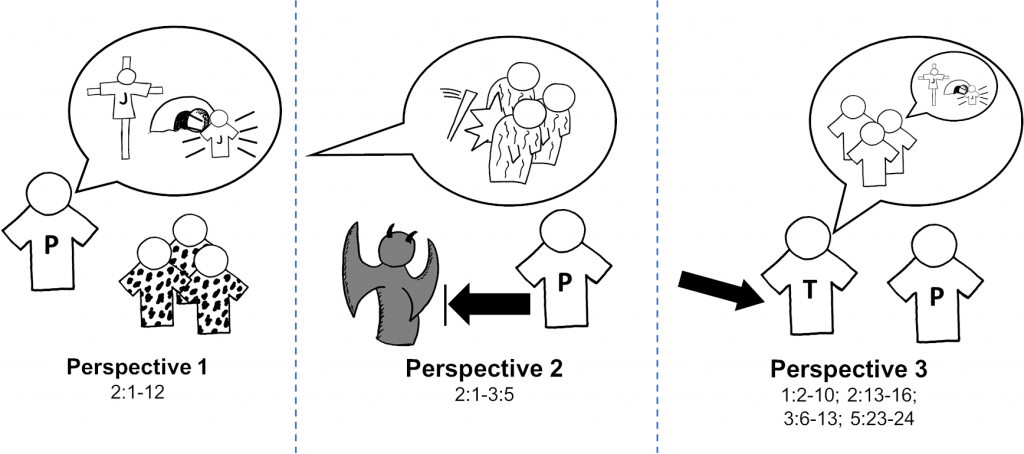One of the main aims of Stretch is to make the fruit of academic theology accessible to ordinary Christians. Theology is for all believers, not just the nerdy ones. One of the intentions of this site, therefore, is to include accessible summaries of any academic work that I publish.
My article “The Doctrines of Election and Perseverance in 1 Thessalonians 1-3” was recently published in the Reformed Theological Review (April, 2020). This post gives a summary of that essay. Try reading 1 Thessalonians 1-3 before and after reading this post. I think you’ll find that it makes this part of the Bible clearer and shows how spiritually beneficial it is.
Assured or Anxious? A Tension in 1 Thessalonians
1 Thessalonians is a letter of the Apostle Paul written to a church which came into existence through his preaching of the gospel. Paul laboured tirelessly among the Thessalonians (1 Thessalonians 2:7-9). Eventually, after establishing them in the faith, he departed the city to continue his ministry elsewhere. However, Paul never lost his love and pastoral concern for the converts of Thessalonica. The intensity of Paul’s concern for this church is clear throughout 1 Thessalonians.
In his letter, Paul expresses two strong and opposite opinions about the Thessalonian beleivers. At the beginning of 1 Thessalonians Paul expresses his certainty that the Thessalonians were “elect” (predestined to salvation) in striking terms:
“…we know, brothers and sisters loved by God, that he has chosen you, because our gospel came to you not simply with words but also with power, with the Holy Spirit and deep conviction.”
1 Thessalonians 1:4-5
This is a very significant claim. Paul claimed to have knowledge that this group of people in particular were of God’s elect. In the broader context of Paul’s theology this meant that they can be assured that they would reach salvation in God’s kingdom (Romans 8:29-30). The letter finishes off by repeating Paul’s certainty of their salvation:
“May God himself, the God of peace, sanctify you through and through. May your whole spirit, soul and body be kept blameless at the coming of our Lord Jesus Christ. The one who calls you is faithful, and he will do it.”
1 Thessalonians 5:23-24
Here Paul both calls upon God to preserve the Thessalonians in the faith, and also expresses assurance that he would, in fact, do so. Both are important. The New Testament presents salvation as a future in God’s Kingdom to which Christians have not yet arrived. Only those who persevere in the faith to the end will be saved. The good news is that God is invisibly at work in his people, preserving them to that end. All those who he has chosen for salvation will arrive there eventually, as God works perseverance in faith in them. Paul’s confidence that the Thessalonians are elect is therefore very significant.
Yet the letter doesn’t just express certainty about the Thessalonian church’s spiritual state. Paul recalls that he had previously feared that the Thessalonians might have fallen away from the faith entirely.
“I was afraid that in some way the tempter had tempted you and that our labors might have been in vain.”
1 Thessalonians 3:5
How could Paul have both of these attitudes toward the same church? And might Paul revert back to anxiety that they had fallen away at a future date?
The Three Perspectives of Paul
1 Thessalonians 1-3 lays out Paul’s recollection of his ministry to the Thessalonians from when he first preached to them up to the time at which he wrote the letter. But it isn’t just Paul telling a story, as though it is history without theology. These chapters express Paul’s theology of perseveramce and assurance in the form of a story. This is a case study in how Paul’s theology plays out in practice.
The underlaying theology is essentially that of Jesus’ parable of the soils (Mark 4:1-20). Jesus describes four different soils that have seed scattered on them, each producing different results. The analogy portrays how different people receive the gospel. The ‘path’ people immediately have the gospel plucked away by Satan and don’t respond with faith at all. The ‘rocky soil’ people outwardly respond with faith at first. However, when persecution comes they immediately fall away, and it becomes clear that they never had deeply-rooted faith in the first place. The ‘thorny soil’ people have the gospel choked by their desires for other priorities. Finally, the gospel flourishes in the good soil, persevering through time and difficulty to produce fruit.
Just as Satan and persecution threaten faith in Jesus’ parable, in 1 Thessalonians they are dangers too. At one point, Paul was concerned that these threats might have destroyed the Thessalonian church. His perspective of the Thessalonian Christians’ faith went through three phases:

P1: Paul’s Initial Visit
Paul initially preached the gospel in Thessalonica and saw many people converted. At this point he believed that they were Christians, but didn’t yet know whether or not they were elect. As in Jesus’ parable, this could only be proven by perseverance through trials over the course of time. Which soil would they prove to be?

P2: Paul absent & unable to help
Now at a distance, Paul hears of that the Thessalonians were facing serious persecution for their faith. He worries that they might fall away and tries to return to help them. However Satan blocked his return (1 Thessalonians 2:18). This led Paul to grow very anxious that the Thessalonians might depart the faith entirely, and prove to be the rocky soil that withers under the heat of persecution.

P3: Timothy’s Report
Paul eventually sent Timothy to Thessalonica in his stead. Timothy returned to Paul with the good news that the Thessalonians were standing firm in the faith (1 Thessalonians 3:6-8). Paul is deeply relieved to know that they have weathered the time of persecution and proven to be the ‘good soil’, bearing bearing the fruit of faith, hope, and love (1 Thessalonians 1:3).
My core claim is that Paul’s certainty of the Thessalonians’ election only came at P3. He wasn’t convinced that the Thessalonians were necessarily elect until he received Timothy’s report. Whilst it might sound like 1:2-10 recall Paul’s observation of their faith when he was first among them (P1), I argue that this was his revised understanding in light of Timothy’s report (P3). Paul did not know that the Thessalonians were elect until after knowing that they had persevered through persecution amd emerged fruitful and firm in Christ.

Three Implications
1. Spiritual Danger is Real
A lot of people assume that predestination means that there can be no dangers to a Christian’s spiritual wellbeing. That is: we shouldn’t worry about Christians falling away since God won’t let them. There is no genuine danger here.
The Bible directly contradicts this attitude. Paul was intensely concerned with the spiritual dangers that face Christians. He believed that professing believers can fall from the faith. Likewise, in the parable of the soils three of the soils start off well, but only one goes the distance. Which soil we are will be proven by the way we respond to trials and difficulties.
2. God uses the Means of Grace
Paul wasn’t worried about the Thessalonians’ faith because of the persecution which they faced. He had already forewarned them that it would inevitable come (1 Thessalonians 3:3-4)! What caused Paul’s worry was that Satan had prevented him from returning to them whilst they were being persecuted. Without his ongoing ministry Paul worried that they would fall away.
This wasn’t Paul being egotistical or distrustful toward God. Rather, he understood that plants enduring the withering heat of the sun need water to survive. Satan had blocked Paul from returning. In his absence the Thessalonians appeared to lack any adequate means of spiritual sustenance. Paul was later delighted to discover that God had sustained the Thessalonians by other means when he could not reach them.
The Bible teaches that Christians persevere and grow in the faith through the means of grace. This term usually describes the role of the Bible and the sacraments in stirring up and renewing faith, but it applies more broadly than that. It describes the various God-given ministries by which our faith in the gospel is renewed, fed, and strengthened.
This is one of the ways in which the doctrine of predestination is different from fatalism. Fatalism teaches that people will end up at their destiny regardless of what they do. Co-operate with fate or don’t, it won’t change anything. In contrast, predestination teaches that God is at work in his elect so that we play an active role in reaching our destiny (Philippians 2:12-13). According to Scripture, we resist God’s work to our own peril. Fatalistic complacency is a dire error. Predestination calls for obedience, perseverance, and active dependence upon God. It doesn’t undermine the means of grace and obedient human action but establishes their essential place in God’s plans.
Thus, even with Paul’s confidence that the Thessalonians were elect, he still believed that they required means of grace to persevere. He prayed for them. He also prayed for a way to return to them so that he could be a further means to their growth and perseverance (1 Thessalonians 3:10-13). Predestination didn’t undermine Paul’s ministry; it gave a basis for it. We can only engage in Christian ministry with confidence when we are aware of how God is at work in the background.
3. Assurance of Salvation takes time to develop
In Jesus’ parable it takes a significant amount of time for the soils to show themselves for what they are. The rocky soil isn’t exposed until a sufficiently hot day. The weedy soil takes time for the weeds to smother it. These responses to the gospel don’t appear all at once. They are in the process of development, often for many years. Likewise, it takes time and experience to observe whether the seed of the gospel has been planted deeply in someone, or whether it will eventually be proven shallow and non-lasting.
Paul came to know the elect status of the Thessalonians by witnessing their perseverance through strong persecution. Likewise, Christians can gradually come to a level of confidence of our elect status as we persevere and grow in Christ through life’s various storms.
We will be in the best position to do this if we take spiritual dangers seriously, and continue to pursue Christ and his kingdom through the enrichment of the means of grace he makes available to us.
Further Reading: Matthew N. Payne. ‘The Doctrines of Election and Perseverance in 1 Thessalonians 1-3’. Reformed Theological Review 79/1 (April 2020): 17-37.
